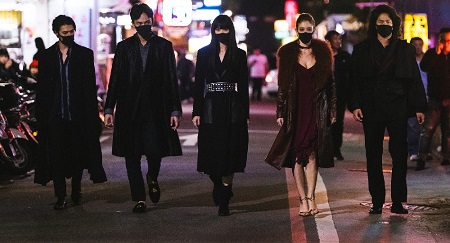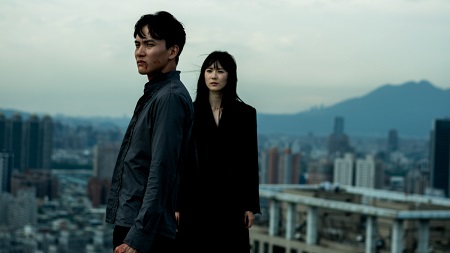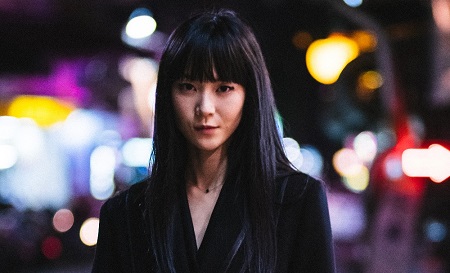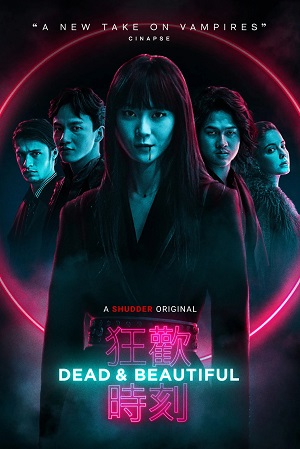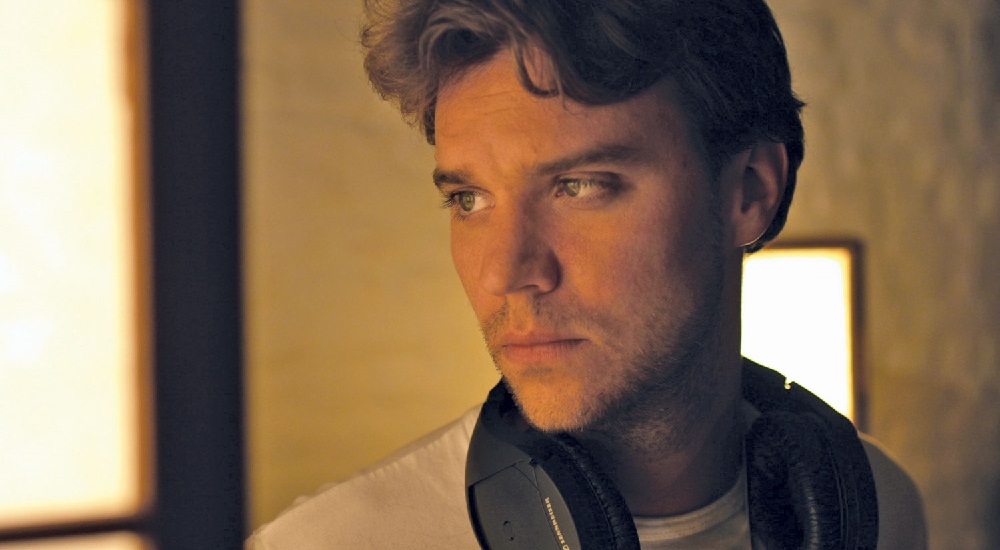
“Dead & Beautiful” – Interview with David Verbeek
by Sara Michelle Fetters - November 10th, 2021 - Film Festivals Interviews
a Fantastic Fest 2021 interview
Generation Undead
Chatting with writer-director David Verbeek about what-if vampire thriller Dead & Beautiful
David Verbeek’s stylish what-if vampire thriller Dead & Beautiful offers up a number of intriguing ideas. It is a visually spellbinding drama that kept my attention start to finish.
The plot revolves around bored, ultra-rich twenty-somethings Lulu (Aviis Zhong), Alexander (Yen Tsao), Mason (Gijs Blom), Anastasia (Anna Marchenko) and Bin-Ray (Philip Juan), all of whom are shuffling through their days and nights while living in Taipei. Each week, one member of the group offers up a surprise for the other four. This week’s challenge? An overnight camping trip to meet with a mysterious shaman.
Things go spectacularly wrong when the five awaken during the night to discover they’ve all grown fangs and have a newfound thirst for human blood. Are they now vampires?
I sat down over Zoom to chat with Verbeek about his latest film. Our wide-ranging conversation touched on quite a lot, including a few items that do tread awfully close to spoiler territory. Please keep that in mind before reading. Here are the edited transcripts of our conversation:
Sara Michelle Fetters: I imagine you had plenty of influences that inspired you to craft this scenario. What was it primarily that led you down this road to these characters and this rather tricky little story that you’ve created?
David Verbeek: I think I was inspired by all the vampire films and series I’ve seen in the last few decades. That, plus my experience of living in Asia and already shooting some films here. I wanted to do something with vampires that was new and that I’d not seen before. I was thinking, what would I do? What would be new now to an audience? What also would be meaningful?
With the whole discussion internationally about how wealth is the 99% versus the 1%, and the whole thing about how the entire global political debate has become so hot on this topic, that seemed like a good starting point. I wanted to do something about extremely rich people, especially the second-generation rich.
You see it in China, where I was living 10 years ago, when I had the original idea. There was this new generation of kids of new millionaires and billionaires, and these kids are kind of lost. They were doing all kinds of extreme things to entertain each other and themselves… and that kind of triggered my imagination. What if we make a film where this very current generation is literally turning into vampires?
It was really only because of the censorship in China that I had to turn it into a fake vampire film, which only made the idea more interesting. My initial idea wasn’t allowed, because you can’t make an actual ghost story or vampire film in China, so I changed it around and that made it more interesting, I think, so sometimes censorship actually helps you to come up with an even better idea.
SMF: It’s interesting that you went right there, because I wasn’t quite sure if we should avoid the spoiler talk or not, as far as to the nature of their bloodthirstiness. As you watch the film, there is this sort of general sense that something very peculiar — other than them just turning into vampires — is going on. What is the balancing act like for you as the writer and for your actors as you all try to walk along this “are they/aren’t they vampires” tightrope?
DV: The cast and the focus on the psychology of the individual characters was key in doing that. Each of the characters reacts to their vampire states — or their presumed vampire state — in a slightly different way, and that’s precisely what makes it interesting.
Everyone kind of takes from the pop culture that we know from the vampire genre. They take what is convenient for them. There is also peer pressure. Like, okay, we’re going to do something. We’re vampires. We’re going to go for this. This kind of takes things to where none of them individually would be willing to go.
They decide to go out and to really drink blood. Alexander takes things even further. At some point, it’s beyond the point of no return. Because I made the choice early on not to actually go into the supernatural, I had to go and to find all the psychological devices that would entertain and that would make an interesting story about how all these characters deal with the situation.
SMF: As the children of the super-rich, it’s as if these characters grew up in sort of a pop culture mélange, because they had nothing else to attach themselves to.
DV: It’s really challenging for them to find a satisfying identity because it’s like, I was already born into this wealth, I am the son or the daughter of powerful so-and-so, so now what do I have to do to prove to the world who I am individually? For some of them, being a vampire might help, because it’s something mystical and mysterious. There’s something super-powerful about them now. All those things are what the film plays with.
But the film also plays with how they are, not just who they are. They are growing up in an experience economy where it’s no longer about material wealth. It doesn’t matter if you have the sports car, because you already have it. You’re used to it. What it becomes about is how to experience something that excites them all the time. Getting that next high.
How do you have an experience that excites you when you’ve already done everything? When you have already traveled everywhere? You have to go more and more extreme to find things that excite you. That is a tragedy that I wanted to explore.
SMF: It’s almost as if they’re playing David Fincher’s The Game every week, only this time things get taken to an even more extreme level.
DV: Yes! Exactly!
Actually, David Fincher’s The Game was a very important movie leading up to this. But I felt that I had to go further than The Game because The Game already exists. At the point where we find out that they’re not really vampires, that’s the point where I felt The Game left off. There’s a game within a game, if you will.
SMF: Talk to me about Lulu. She is such a fascinating character. I don’t want to give too much away, but it’s a truly complex characterization, and I think it’s interesting that her background appears to be different that that of her friends.
DV: For her character, I would say it was the golden rule of “less is more.” You don’t know much about her. For everyone I give their family fortune value, their estimated value, and for her it just says “unknown.” Why? Because, maybe it’s in flux? Maybe there’s something changing? We don’t know, and I didn’t want anyone to know. I wanted people to have lots of interpretations of why she does what she does. I didn’t want to spell it out.
With her family background, Lulu is triggered somehow to do something. She wants to talk about how rich they all are and how that exploit other communities. But you can also question her actions psychologically. Perhaps she initiates what she does because she wants to find out what her friends are made of, what they’re capable of, and, even beyond that, she wants to find out how she herself feels about certain things.
I think what her character shows very well is the loneliness and isolation that the position of extreme wealth brought her to. (At first there were also more scenes with her mother, but for pacing reasons, they aren’t in the film.) People that are in this kind of position, they usually hang out with groups that are similar, just like celebrities usually date and marry other celebrities, because they can relate to each other, because they have the same limitations in life. With Lulu, I think she provides insight on how difficult things become when you’re in these closed circles.
SMF: It’s a strong ensemble, but Aviis Zhong is sneakily extraordinary as Lulu. Were there ever moments you were surprised by the performances you were getting?
DV: Yes. Definitely. Mostly there were some moments when we were filming when I was like, wow, this is really good. But where it really hit me most is the first time we saw the film in the theater. We shot the whole thing with anamorphic lenses, and the emotions on the faces — even when they’re saying nothing, and how hard those things hit, especially at the end of the film — really impressed me, especially that first time with an audience.
Aviis is a very subtle actress. She’s not into big expressions. But there’s a lot behind the mask, It’s there. I’m really proud of my actors.
SMF: What do you want people to take away from the film? What do you hope they’re talking about after it’s over?
DV: I think we covered some of it. I do think that it is meaningful to show something from the ultra-rich because we live in such a capitalist society in so many countries, and a lot of people aspire to become wealthier and wealthier. To show this ultimate depiction of wealth and then to realistically psychologically show that it doesn’t make life easier, and how it is actually kind of connected to the Dracula genre, that’s pretty cool. It’s about isolation and loneliness. Even if you’re from a super wealthy group of friends, that does not make it any easier to just say, “Hey. I like you, and I have feelings for you.”
You could say this story is very much about the inability to simply just be upfront and honest. I think that’s something to think about. I love how that kind of becomes more meaningful as things go on.
I do hope that the film will make people consider and think about these things. I like films that, as soon as they’re over, I’m not still done with them. I like when there is something more to keep figuring out.
– Interview reprinted courtesy of the SGN in Seattle
